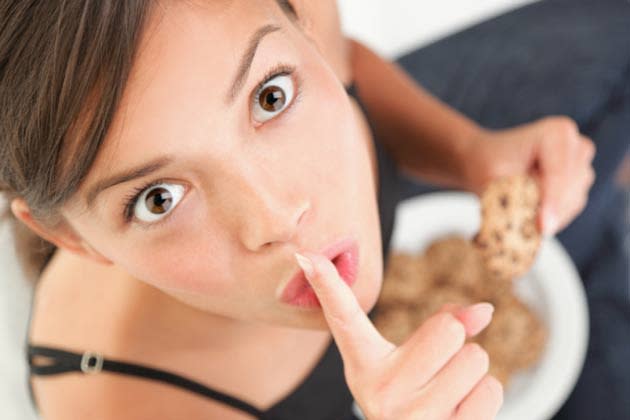Put a Stop to Emotional Eating

Ever had a stressful day at work where all you want to do is have a big slice of chocolate cake or hit the nearest resto-bar and eat sisig? Don't worry—it happens to all of us.
The thing about emotional eating is that we do it whether we are happy or sad, though the latter is more likely to cause you to emotionally eat. In fact, it can be something that we learned as a child—a child who is given treats after a big achievement may grow up associating food for a job well done, or that a cookie is comfort food for when we cry, leading us to rely on food to soothe us.
Food for thought Why do we do emotionally eat? Experts say it is as a way of diverting your attention from the real reason, especially if you are dealing with a negative situation. "Food can act like a drug," says Geneen Roth, author of Women, Food and God in an interview with Shape. "It can take the edge off whatever is going on, similar to the way a drink does for alcoholics. People think to themselves, 'I may be feeling upset but at least I get to taste something good."
Unfortunately, emotional eating is a temporary solution to confronting your emotions, which is why if you don't learn to control it, your diet—and body shape—can be affected. Says Linda Spangle, author of 100 Days of Weight Loss, "After you're done eating, you still have to deal with the original problem." Not only that, you will also tend to beat yourself up for giving in to your weakness, which in turn makes emotional eating a vicious cycle!
Surely it can't be all that bad for you? Aren't we allowed a treat—or an eating pity party—once in a while? Thankfully, going down the emotional eating route is not entirely the end of your diet, says Jean Fain, psychotherapist and author of The Self-Compassion Diet in a Real Simple story. "It's healthy to emotionally eat once in a while—to eat for comfort, to celebrate, or just because. Sure, you could go for a walk or head to the gym but sometimes an ice cream sundae is just the thing.
Stop the constant emotional eating However, if you think your emotions are taking over your diet, then it is time to pay heed to your cravings. Emotional eating becomes a problem if you find yourself hitting the fridge instead of confronting a problem, constantly punishing yourself after having a treat (remember the vicious cycle), if your weight escalates while your fitness level deteriorates, and if you are overloading on bad carbs and fatty foods.
Want to stop emotional eating? Try these ideas:
1. Write down your emotions Before you turn to food, pick up your pen and write down exactly what you're feeling and thinking. Seeing how you feel on paper will help you understand as well as recognize the times when you're most likely to emotionally eat (so you can avoid falling into an emotional guilt trap). Don't believe this will work? A study from the University of Kentucky cited in Real Simple magazine found that those who were aware of how they felt chose healthier and lower-calorie foods.
2. Find a different distraction Eating to deal with boredom? Why not pick up a hobby to take your mind away from food? Says the popular Dr. Oz in Oprah Magazine, a mental distraction will take your mind off your worries as well as your need to turn to food. So read a book, treat yourself to a massage, or hit the gym the next time you feel like eating because you're down.
3. Have a healthy bite first Still feel like emotionally eating? Try this tip from Joy Bauer, author of Food Cures: Make it a point to eat three healthy foods (e.g. fruits, apples, non-fat yogurt) before you hit the comfort foods. This should keep you full from wanting to eat more. And if you after that you still want your comfort food, go on—indulge yourself.
4. Get some shut eye Not getting enough sleep? That could also be a reason why you're emotionally eating, says Susan Albers, author of 50 Ways to Soothe Yourself Without Food in Mother Nature Network. "When we're tired, we tend to give up and we don't make smart, clear decisions." Not only that, staying up late can also make you crave for junk food—which is why you find yourself snacking when burning the midnight oil. Alber's advice? Simple—sleep more. Still feeling tired? Take a power nap if you can.
